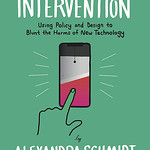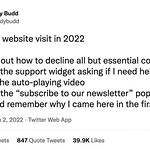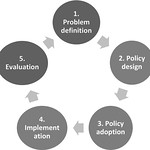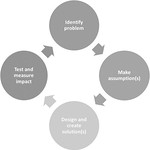Deliberate Intervention

Using Policy and Design to Blunt the Harms of New Technology
“Do no harm” is Alex Schmidt’s mantra throughout Deliberate Intervention—a book that delves into how policy and design can work together to prevent harms in technology. Using the journalistic approach she employed as an NPR reporter, Schmidt studies the history of policy making, its biases, and its evolution in the changing technology field. The beginning of each chapter highlights a graphic showing the transformation of policy and design, drawn by well-known illustrator, MJ Broadbent.
Readers will learn:
- How policy and design can partner.
- The history of policy and how evident harms have led to policy interventions and improvements.
- As harms emerge from technology, individuals and companies really do have the tools to intervene.
- Government can control harms with new policies.
- How to create better policy with solid design measures.
- What the future looks like for people with the advent of new technology.
Who this book is for:
This book is for anyone who is concerned about the harms of technology and interested in ways to circumvent them, i.e., policy makers, CEOs of tech companies, IT people, designers, lawyers, security analysts, product managers, healthcare workers, historians, writers—in other words, just about everyone. It’s particularly helpful for anyone who is designing anything that involves technology and is worried about the potential harm in their decision-making.
“Do no harm” is Alex Schmidt’s mantra throughout Deliberate Intervention—a book that delves into how policy and design can work together to prevent harms in technology. Using the journalistic approach she employed as an NPR reporter, Schmidt studies the history of policy making, its biases, and its evolution in the changing technology field. The beginning of each chapter highlights a graphic showing the transformation of policy and design, drawn by well-known illustrator, MJ Broadbent.
Readers will learn:
- How policy and design can partner.
- The history of policy and how evident harms have led to policy interventions and improvements.
- As harms emerge from technology, individuals and companies really do have the tools to intervene.
- Government can control harms with new policies.
- How to create better policy with solid design measures.
- What the future looks like for people with the advent of new technology.
Who this book is for:
This book is for anyone who is concerned about the harms of technology and interested in ways to circumvent them, i.e., policy makers, CEOs of tech companies, IT people, designers, lawyers, security analysts, product managers, healthcare workers, historians, writers—in other words, just about everyone. It’s particularly helpful for anyone who is designing anything that involves technology and is worried about the potential harm in their decision-making.
Testimonials
Deliberate Intervention is an in-depth, thoroughly cited guide on the intersection of policy and design, employing a narrative style that makes the complex subject matter fun to read and easy to grasp without losing any of its gravitas. An absolute must-read for any citizen designer.
Lisa Baskett, Healthcare Design Strategist
What will it take to design technology that does less harm? This subtle book offers thoughtful, nuanced, sometimes unexpected answers. It’s a good read for any curious user of technology. And for anyone who shapes or regulates new products, reading it is a step toward doing good by designing well.
Conor Friedersdorf, Staff Writer, The Atlantic
This book is what America needs right now. With our democracy in dire straits and tech companies threatening our rights and privacy, the need for us to be proactive about policy is at an all-time high.
Ginger Reinauer, Senior Product Designer
This book is an important resource for people in civic tech looking to navigate the complex relationship between policy, design, and technology. I wish it had existed earlier in my career!
Eddie Tejeda, Civic Technologist and Engineering Director
Alex provides a novel lens based on the intersection of design and policy. Her book provides an excellent foothold for creating beloved and successful products that minimize potential harms. It also helps policymakers more thoroughly consider their approach in the design of new regulation. It’s essential reading for those who want to help their organization become more effective while making the world a better place.
Theo Linnemann, Computer Scientist and Technology Evangelist
Table of Contents
Foreword by Enrique Martínez
Chapter 1: A View of the Future
Chapter 2: Policy and Design Basics
Chapter 3: A Brief History of Policy and New Technology
Chapter 4: Unconstrained Spaces and the Emergence of Harm
Chapter 5: Internal Interventions
Chapter 6: The Beginning of Outside Regulation
Chapter 7: Design in Policy-Constrained Domains
Chapter 8: Bringing Policy and Design Closer Together
Chapter 9: Using Design to Create Better Policy
Chapter 10: Enterprise Design and the Policy Space
Sample Chapter
This is a sample chapter from Alexandra Schmidt’s book Deliberate Intervention: Using Policy and Design to Blunt the Harms of New Technology. 2022, Rosenfeld Media.
Chapter 1: A View of the Future
A father in a suburban U.S. town returns home after dropping his children off at school and unfastens his seatbelt, just in time to receive a package delivered by a drone. He walks inside and checks his retirement account on his phone, using facial recognition to log in. In a large city a few hundred miles away, an undocumented immigrant walks into his job at a restaurant. He has his movements tracked through his smartphone, unbeknownst to him, so that the spread of a new viral infection can be traced by health experts. Overseas, a deployed member of the military checks her social media feed and sees political ads regarding an upcoming election. She puts her phone in her pocket and walks to a nearby barracks for training on a new piece of military targeting technology.














